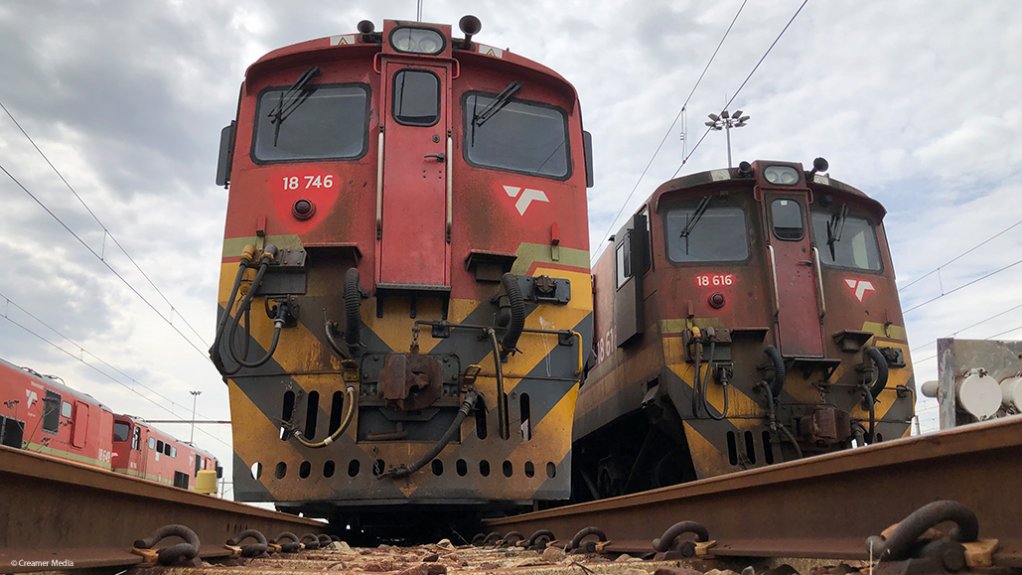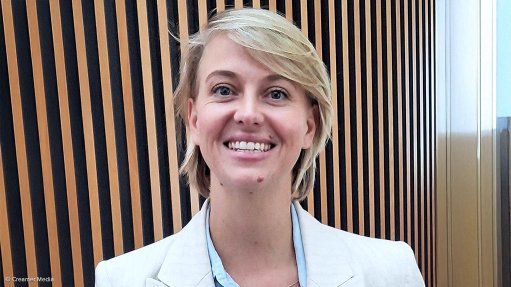Robust debate unveils complexities of resetting South Africa's logistics system
Private- and public-sector representatives have, this week, emphasised that there are potential solutions to South Africa's logistics problems and bottlenecks, that funding is limited and that collaboration among private companies, labour and government is necessary to address the problems.
Speakers participating in a 'Logistics Roadmap to unlock greater efficiency and sustainability' panel discussion, during a transport engagement platform organisation Transport Forum conference on December 4, also highlighted the many barriers and delays all parts of the logistics sector face.
South Africa was an expensive logistics country and had high logistics costs built into its economy, because its people lived mostly in the central parts of the country and ports were far from these areas, said adviser to the Department of Transport rail reform advisory council for Operation Vulindlela Jaap van der Merwe.
The country's logistics costs have also crept up over the years, and the sector has difficulty keeping these costs down.
"The system needs to be reset and redesigned. The [South African National Roads Agency] model must take hold, as it is conducive to introducing competition," he said.
From a shipping perspective, African and Southern African countries were generally resilient in the face of events in other parts of the world, such as those impacting East-West trade, and presented opportunities for growth, said shipping and logistics company AP Moller - Maersk Southern Africa and Indian Ocean islands area head of sales Theo Pappas.
"The challenges are well documented, and we are struggling with failing infrastructure, but, and more so post-Covid-19, there is a greater willingness of business to come together to find solutions," he said.
While every company must make a profit, there is also the bigger view of how each company can help fix these problems.
"There is a clear appetite for business in Africa as a market that they want to grow in and we are willing to invest in infrastructure, including in South Africa," he noted.
The country was losing opportunities because it was not getting together as an industry to confront the issues, said shipping and logistics company Mediterranean Shipping Company director and maritime economist Innocentia Motau.
Government must also listen to the industry to create solutions that addressed the issues the shipping industry was facing, she added.
Where the current monopoly model is not working, public sector participation (PSP) initiatives must be encouraged, but they must be structured correctly to address the issues.
"We stopped investing in efficiency about seven years ago. Efficiency is expensive, but we must be willing to pay for it because we need to be competitive and ensure that the price of doing business is not too high," she said.
PSP was a way of getting other parties to invest in fixed infrastructure so that the railway lines could recover and handle more volumes. However, it took at least 24 months for a PSP to reach financial close currently, said Van der Merwe.
"But what must South Africa do in the meantime? The coal line is broken, the Natal mainline is broken and the iron-ore line is broken.
"We are busy putting in place bridge finance - from the private sector because the State does not have money to put in - and we need to somehow tie this back to the future investment. This is one of the complex problems we are trying to solve," he illustrated.
A ship could cost $20 000 to $70 000 a day to charter and each day one was delayed added costs, which were paid by the end customer. The quicker ships could get in and out in a safe working environment, the lower the unit costs, meaning that larger ships could be used, said Pappas.
"This creates more opportunities, and more entrepreneurs can get their products in and out of the country. This need is the sole reason why we are pro public privatisation. We have seen it work around the world and in Africa in particular. Let the people who know how to operate a terminal do so," he said.
CAUSE AND SOLUTION
The reason South Africa's logistics system was in such a poor state was because there had been underinvestment in infrastructure over the past 15 years, said union United National Transport Union (UNTU) secretary-general Cobus van Vuuren.
"The debt-to-GDP ratio is between 70% and 80%, meaning that there is no money from government and [State-owned logistics agency] Transnet cannot invest further money in infrastructure because it is incapacitated. It has R160-billion of assets valued at R61-billion. It is overindebted.
"Transnet has been painted into a corner. This is where the narrative that we have to be saved comes from," he said.
UNTU is against the unbundling and vertical separation of Transnet because it believes this will lead to job losses among its members.
"For example, because of the dilapidated infrastructure, we only have five slots available a day to Richards Bay or to Saldanha Bay. If we allocated one to a private sector partner, that would directly mean that Transnet would need a fifth fewer people," he said.
Industry organisation the South African Association of Freight Forwarders CEO Dr Juanita Maree, who moderated the panel discussion, countered that the Natcor rail line from Durban to Gauteng had managed to run 48 trains a day in each direction, but currently only did 19 a day.
"If we can fix the infrastructure, we can have enough slots for Transnet and private operators," she said.
However, the problems are significant and severe, with Van Vuuren pointing out the scale of the underinvestment in infrastructure and equipment by highlighting that the Port of Coega needs two pilot boats and has only one available.
"In the Port of Cape Town this morning, of the 31 rubber tyred gantry cranes, 19 were not working. Two Konecranes have been booked in blocks K7 and K4, but they are not operational. Three ship-to-shore cranes were also non-operational. It is no wonder we are not achieving the efficiencies needed and why our efficiencies are not where they should be," he said.
Similarly, at the Port of Durban Container Terminal 2 (DCT2), 48 straddle carriers out of 88 are standing still; more than half the equipment is not functional. Of the 12 empty container handlers in DCT2, only 6 are working.
In DCT1, only one of the five empty container handlers is working, and only two reach stackers of three are available for use.
"This is the situation at only two ports. The same can be said of Transnet Freight Rail, which has 324 locomotives that are not operational.
"The reality is that the lack of investment in infrastructure has led to equipment that is far past its lifespan and the consistent breakdown of machines is why we are in this situation," said Van Vuuren.
"We [the union] are against privatisation because it would lead to job losses among our members, which we cannot afford in our country with a very high unemployment rate, and because it would lead to the selling of assets. We are against it for those two reasons," he said.
The only solution was to invest in the infrastructure and equipment, and the funding would have to come from somewhere. However, the funds must be spent in the right places and not done at the expense of the country's assets or people, he added.
Motau emphasised that there was, therefore, a need for workshops to work 24 hours a day to fix the equipment that South Africa had.
"We have solutions. What we want is the will from government to be less rigid in formalising unsolicited bids so that we can have short-term plans in place to fix our ports," she said.
When the Port of Durban had 124 straddle carriers, the system had sufficient fluidity and was able to do around 22 moves an hour.
However, the port now only has 50 straddle carriers and has ordered 20 more, but this will still not provide the 124 needed to get sufficient fluidity to get the port to be efficient.
"We are in the pits and are not getting better. We need to collaborate differently to solve the logistics problems. Transnet does not have money, but shipping lines, as port users, pay tariffs to Transnet. The money can be taken from the tariffs that the shipping lines will pay.
"PSPs must be about helping to improve efficiency, reducing the cost of doing business and using existing financial instruments to help the port and also to attract volumes. There are the top two shipping companies by volume globally on this panel that are willing to help, but we need efficiency," she said.
Meanwhile, a key issue was that Transnet had been assigned the obligation of solving the whole country's logistics problems, said Van der Merwe.
"A company will eventually run out of steam. This happened before in 1992 when the infrastructure was dilapidated and there was no money. This was addressed through business processes and technologies, but the fact that we are facing this problem again means we have not solved it."
Additionally, when Transnet had full control over the network in 2010, it only had 16 slots in operation on the Natcor line, and the underuse of the network was not new.
"It is clear that Transnet has not figured out how to use the network that it has. Having only ten slots available means that, over time, the company stops maintaining the line and now faces a similar challenge to that faced by [State-owned] Eskom."
The apex key performance indicators of efficiency, efficacy and cost optimisation must be met. The main question when developing a new logistics architecture was whether is made South Africa competitive at a supply chain level, he said.
"No matter the price that must be paid internally, if we cannot do that, then we are not a competitive economy. The country, not Transnet, must solve the problem.
"South Africa is unfortunately in the situation where it cannot afford the luxury of an integrated monopoly. There will be struggles, the new system will not be perfect and we will have to figure it out as we go," said Van der Merwe.
Article Enquiry
Email Article
Save Article
Feedback
To advertise email advertising@creamermedia.co.za or click here
Press Office
Announcements
What's On
Subscribe to improve your user experience...
Option 1 (equivalent of R125 a month):
Receive a weekly copy of Creamer Media's Engineering News & Mining Weekly magazine
(print copy for those in South Africa and e-magazine for those outside of South Africa)
Receive daily email newsletters
Access to full search results
Access archive of magazine back copies
Access to Projects in Progress
Access to ONE Research Report of your choice in PDF format
Option 2 (equivalent of R375 a month):
All benefits from Option 1
PLUS
Access to Creamer Media's Research Channel Africa for ALL Research Reports, in PDF format, on various industrial and mining sectors
including Electricity; Water; Energy Transition; Hydrogen; Roads, Rail and Ports; Coal; Gold; Platinum; Battery Metals; etc.
Already a subscriber?
Forgotten your password?
Receive weekly copy of Creamer Media's Engineering News & Mining Weekly magazine (print copy for those in South Africa and e-magazine for those outside of South Africa)
➕
Recieve daily email newsletters
➕
Access to full search results
➕
Access archive of magazine back copies
➕
Access to Projects in Progress
➕
Access to ONE Research Report of your choice in PDF format
RESEARCH CHANNEL AFRICA
R4500 (equivalent of R375 a month)
SUBSCRIBEAll benefits from Option 1
➕
Access to Creamer Media's Research Channel Africa for ALL Research Reports on various industrial and mining sectors, in PDF format, including on:
Electricity
➕
Water
➕
Energy Transition
➕
Hydrogen
➕
Roads, Rail and Ports
➕
Coal
➕
Gold
➕
Platinum
➕
Battery Metals
➕
etc.
Receive all benefits from Option 1 or Option 2 delivered to numerous people at your company
➕
Multiple User names and Passwords for simultaneous log-ins
➕
Intranet integration access to all in your organisation




















